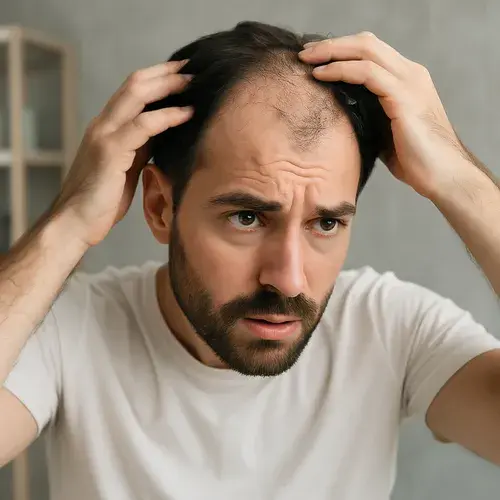What Happens When Hair Growth is Disrupted. Causes of Disrupted Hair Cycles and Solutions
Discover how stress, hormones, nutrition, and scalp health disrupt hair growth cycles, causing hair loss. Learn effective solutions to restore and

Hair growth is a complex process that involves the coordinated effort of various biological mechanisms. When these mechanisms are disrupted, it can lead to noticeable changes in hair health, including hair loss and thinning. Understanding the causes and solutions for disrupted hair cycles is crucial for maintaining healthy hair. The Normal Hair Growth Cycle Before diving into the causes of disrupted hair cycles, it's essential to understand the normal process. The hair growth cycle consists of three main phases: the anagen phase (growth), the catagen phase (transition), and the telogen phase (resting). The anagen phase is the longest, lasting several years, during which the hair grows. The catagen phase is a short transitional period that signals the end of the growth phase. Finally, the telogen phase is a resting period that lasts about three months before the hair falls out and is replaced by a new hair. Causes of Disrupted Hair Cycles Several factors can disrupt the normal hair growth cycle, leading to various hair loss conditions. Here are some common causes: Stress and Hormonal Imbalance: Stress can induce telogen effluvium, a condition where a significant number of hairs enter the resting phase prematurely. This can be exacerbated by hormonal imbalances, particularly in women. Chronic stress or extreme hormonal changes can lead to short, sudden bouts of hair shedding with little to no new hair growth. Hormonal Influences: Hormonal changes, such as those experienced during pregnancy or menopause, can also disrupt the hair growth cycle. For example, increased levels of dihydrotestosterone (DHT) can shrink hair follicles, leading to hair miniaturization and conditions like androgenetic alopecia. Nutritional Deficiencies: Lack of essential nutrients like iron, zinc, and biotin can impair hair growth. These deficiencies can lead to extended telogen phases or premature shedding during the exogen phase. Scalp Conditions: Inflammation caused by conditions like dandruff or psoriasis can impede the natural flow of the hair growth cycle by restricting blood supply to hair follicles. Medications: Certain medications, such as those used for cancer treatment, can cause hair loss by disrupting the hair growth cycle. Solutions for Disrupted Hair Cycles While some causes of disrupted hair cycles are beyond our control, there are several steps we can take to address them: Manage Stress: Engaging in stress-reducing activities like yoga, meditation, or deep breathing exercises can help mitigate the effects of stress on hair health. Balance Hormones: For hormonal imbalances, consulting a healthcare provider for appropriate treatment is crucial. This might involve hormone replacement therapy or other medications. Nutritional Support: Ensuring adequate intake of essential nutrients through a balanced diet or supplements can support hair growth. Foods rich in omega-3 fatty acids, vitamin E, and zinc are particularly beneficial. Scalp Care: Maintaining a healthy scalp through regular washing and using gentle shampoos can help prevent conditions like dandruff and psoriasis. Medication Management: If you're taking medications that are known to cause hair loss, discuss alternative options with your healthcare provider. In some cases, switching medications or adjusting dosages might help minimize side effects on hair health. Professional Help: Consulting a dermatologist or hair loss expert can provide personalized advice and treatments tailored to your specific condition. They may perform scalp analyses to identify underlying issues and recommend appropriate treatments. By understanding the causes of disrupted hair cycles and implementing these solutions, individuals can take proactive steps towards maintaining healthy hair growth. While some conditions may require medical intervention, lifestyle changes and proper care can significantly impact the health and appearance of your hair.
Need Professional Consultation?
Our professional doctors will provide detailed hair and scalp analysis and develop personalized treatment plans.
Book Consultation Now